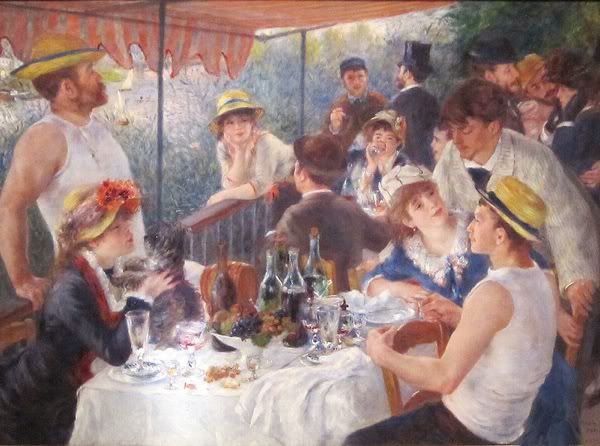M. Legrandin. We met him back on pp.91-92, as the launcher of "furious tirades" "at the aristrocracy, at fashionable life, at snobbishness." Now we see "a Legrandin altogether different" (p.175), actually a social climber, it would seem. He snubs the family on a number of occasions. M dines with him alone and he claims to be a Jacobin, but M senses duplicity in him.
"But what I did understand was that Legrandin was not altogether truthful when he said tha the cared only for churches, moonlight, and youth; he cared also, he cared a very great deal, for people who lived in country houses, and in their presence was so overcome by fear of incurring their displeasure that he dared not let them see that he numbered among his friends middle-class people, the sons of solicitors and stockbrokers, preferring, if the truth must come to light, that it should do so in his absence, a long way away, and 'by default.' In a word, he was a snob." (p.180)Legrandin is really playing two people, one for the middle class and one for the upper, landed, or noble class, and for each he pretends to hate the other. There is implication of social mobility here, a characteristic of these years in the third republic. This also harks back to M's earlier reflection: "even in the most insignificant details of our daily life, none of us can be said to constitute a material whole, which is identical for everyone, and need only be turned up like a page in an account-book or the record of a will; our social personality is a creation of the thoughts of other people." (p.23).
Legrandin is also another example of the social triangle, this time a man caught between two classes of people, trying to maintain relationships with both while keeping the other unawares.
Françoise the cruel (p.170) Another view of Françoise, as the chicken brutalizer and insensitive head maid, except that she would apparently lay down her life for her own family, and really goes to great lengths for Léonie as well (although that could be said to be for her own family in the end).
And M brings things around so neatly, that the scads of asparagus mentioned earlier (several times, but most notably in an exchange with Léonie on p.79 "What, Françoise, more asparagus! It's a regular mania for asparagus you've got this year."), seemingly in passing, comes back on p.173 as a cunning plan of Françoise's to be rid of one of the kitchenmaids, who is allergic to it.
Cool stuff
Paul Desjardins (quoted by Legrandin on p.167) was a French philosopher who knew Proust and his family intimately.
Balbec is modeled off the real world Cabourg.
Notable (?) passages
"But what most enraptured me were the asparagus, tinged with ultramarine and pink which shaded off from their heads, finely stippled in mauve and azure, through a series of imperceptible gradations to their white feet—still stained a little by the soil of their garden-bed—with an iridescence that was not of this world. I felt that these celestial hues indicated the presence of exquisite creatures who had been pleased to assume vegetable form and who, through the disguise of their firm, comestible flesh, allowed me to discern in this radiance of earliest dawn, these hinted rainbows, these blue evening shades, that precious quality which I should recognise again when all night long after a dinner at which I had partaken of them, they played (lyrical and coarse in their jesting like on of Shakespeare's fairies) at transforming my chamber pot into a vase of aromatic perfume." (pp.168-169)
There is no ode to asparagus like this one, and perhaps Proust can be quite the humorist

